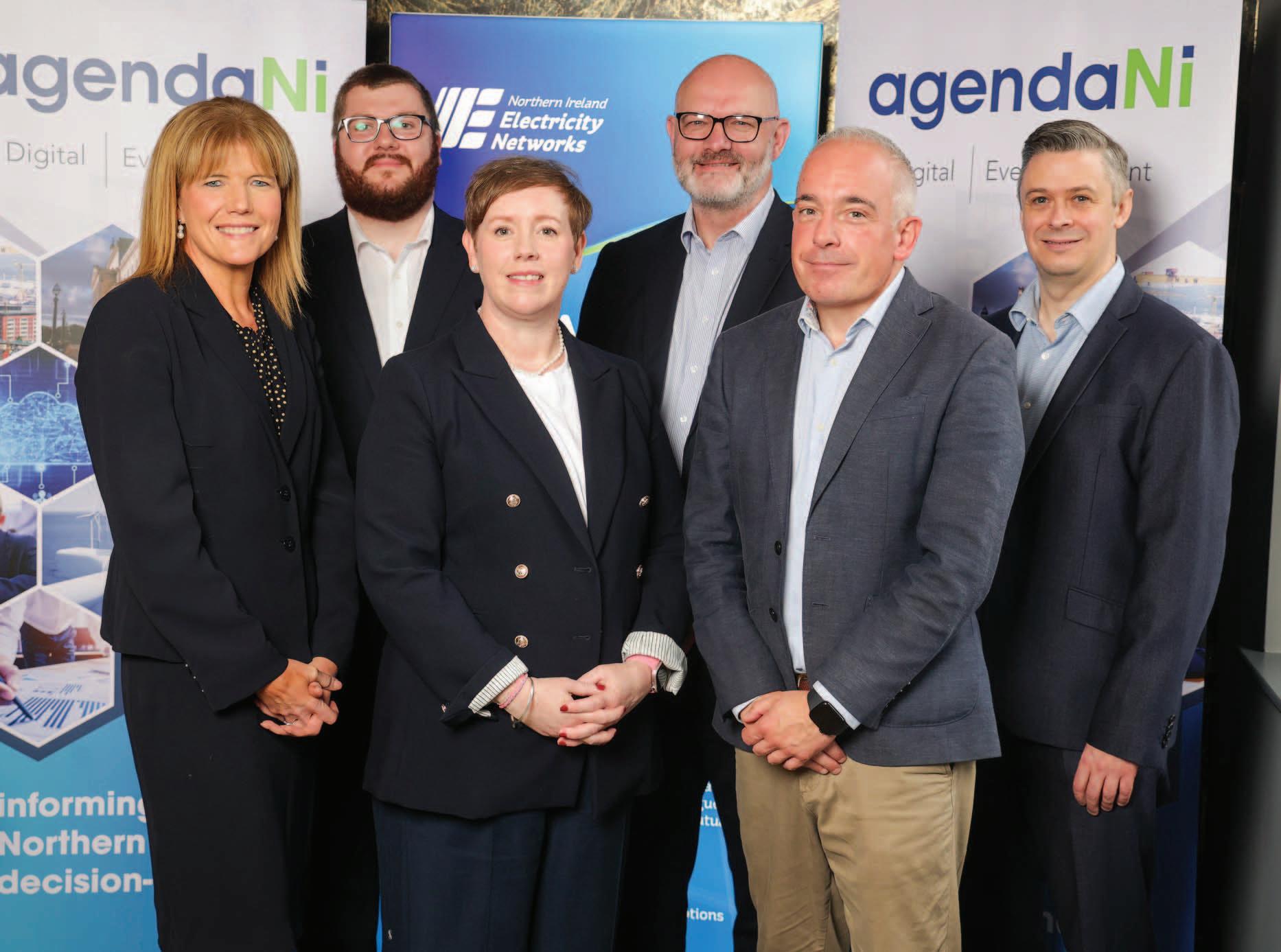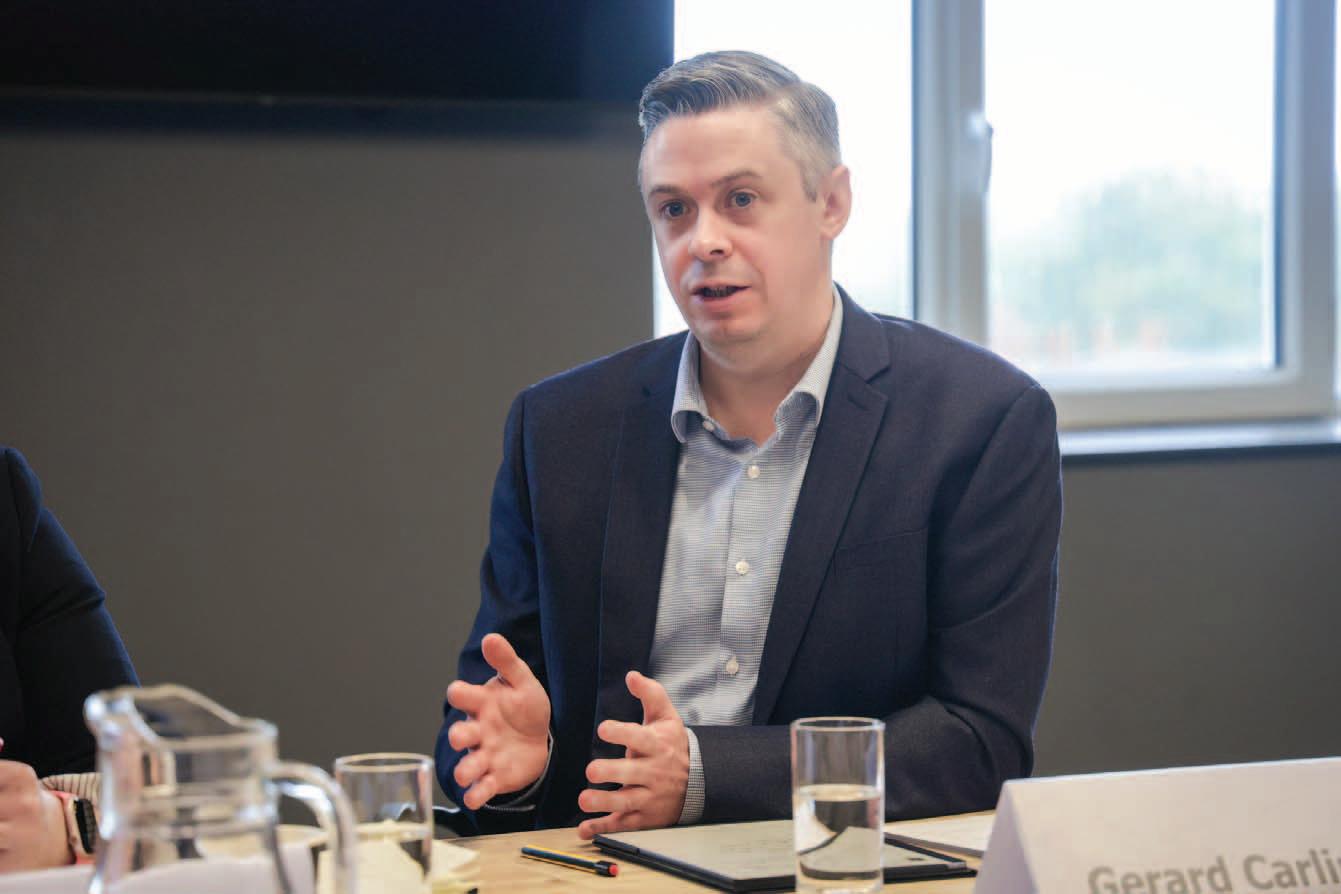
Round table discussion hosted by




Round table discussion hosted by



NIE Networks hosted a round table discussion with stakeholders from the energy and private sector to discuss how to increase demand on the electricity network to realise the Executive’s economic vision.
Round table discussion hosted by

How can Northern Ireland attract investment from high energy use industries such as advanced manufacturing, data centres, and green hydrogen production as a stimulus to energy demand and growth?
Derek Hynes
Our current pathway towards 2050 requires connecting more renewable generation, but there is currently a reduction in demand at the same time, leading to increasing constraints. Getting more out of the existing network means we must be less conservative in our network planning and how we accommodate new demand connections. Greater ambition in releasing demand capacity available will make connections faster and cheaper. That would attract investment as companies respond to these measures.
Eugene Heaney
Invest NI has seen the number of international businesses operating in Northern Ireland rise 79 per cent between 2014 and 2024. Going forward, it is important that we focus on those low carbon green technology sectors. We are looking at ways to exploit curtailment. Belfast is a top five region for R&D globally with an FDI strategy ahead of many medium regions within Europe. Invest NI has identified six priority sectors that Northern Ireland could advance on: low carbon transport, green fuel, sustainable water, carbon services, low carbon retrofit, and renewable energy. Each of these bring huge benefits to the grid and decarbonisation.
Sara Tinsley
Speaking from our members’ perspective, we would advocate a demand strategy to support growth. From a Northern Ireland perspective, data centres and green hydrogen are new developments and technologies. The difficulty is that we are behind others in terms of legislative provisions such as a climate action plan, which help support and drive these industries. We should consider enhanced investment zones to turbocharge investment, locating it in freer consenting areas and matching cluster with the acceleration. We have a lot going for us, but there is still more to do to encourage those industries to come here.
Gerard Carlin
The system can incorporate more demand. As Derek previously mentioned, electricity use is falling year on year, and that presents a problem. As a transmission system operator, more demand in the right locations is good for us and it supports economic development. Why are we moving to renewable energy sources? To address climate change. There is a big opportunity in that, because we are talking about a race to electrification and energy transition, and those economies and regions that decarbonise and electrify first will win the prize of economic investment.
Clare Guinness
Fiscal levers should be used such as enhanced investment zones which was proposed nearly two years ago, but nothing is forthcoming. It was certainly supposed to drive the green economy, net zero, and the transition race. Without those sorts of fiscal incentives, it is difficult to attract the right investment. Data centres are mentioned a lot, but they do not create much employment. We need to be selective in terms of which industries that we go for. In Northern Ireland, we need investment in economic infrastructure. That will generate good jobs and decarbonise at the same time.





Gerard Carlin
Gerard Carlin is SONI’s Director of Networks and Innovation. He joined SONI in 2024 and is responsible for future markets, future power systems and connections and networks. Carlin has 20 years of experience in rail, water and oil, and gas Industries. He held leadership roles at London Underground, Crossrail, and Transport for London before joining Northern Ireland Water in 2021 where he worked as Head of Transformation and later, Head of Climate Change. In 2018, he was part of the leadership team brought in to recover the Crossrail project, and as Programme Transition Director was responsible for the handover of the Elizabeth Line.
Clare Guinness
A finance graduate, and Chartered Director, Clare Guinness has over 25 years’ commercial experience across various sectors including banking, agri-food and infrastructure. She has held a number of senior roles including Head of Business Banking, COO, and CEO, as well as being a Non-Executive Director for Progressive Building Society, Visit Belfast, and Peace Players. As the CEO of Belfast Chamber, Guinness works to make Belfast a global destination for business growth and a better place to live, learn, work, visit, and invest.
Eugene Heaney
As Head of Green Economy Development at Invest NI, Eugene Heaney focuses on empowering Northern Ireland businesses to seize global green economy opportunities and drive decarbonisation. He leads strategic initiatives focused on energy transformation and sustainable growth. Most recently, Heaney spearheaded the Industrial Decarbonisation for Northern Ireland project, delivering a first-of-its-kind plan by identifying industrial clusters with the potential to collectively reduce carbon emissions and accelerate the region’s transition to net zero.
Derek Hynes
Derek Hynes is the Managing Director of NIE Networks. He was appointed to the Board on 1 September 2022. He is a director of Energy Networks Association Ltd. Hynes joined ESB in 2000 where he held a number of senior management positions, mostly within ESB Networks DAC, the independent ring-fenced subsidiary within ESB Group, including as Head of Project Delivery and Network Operations Manager. He was also Residential Ireland Manager of Electric Ireland, a retail business within ESB. Hynes is a chartered engineer with post graduate qualifications in Operations Management and Corporate Governance and he has completed the Advanced Management Programme at Harvard University.
Sara Tinsley


Sara Tinsley, Planning and Environmental Consents Manager with Energia, is a Chartered Town Planner and current Deputy Chair of RenewableNI. She is responsible for delivery of planning and environmental matters associated with development, operational and construction sites across Ireland for wind, solar, battery storage, and hydrogen production. Tinsley has successfully secured consent for a number of large scale strategic infrastructure developments and is involved in the shaping of policy and regulatory inputs to energy policy across the Island. She is also an active member of Wind Energy Ireland.

“We would advocate a demand strategy to support growth.” Sara Tinsley
We ought to use the fiscal levers we have at our disposal optimally and aim to align policy and regulation behind economic incentives.
What support do indigenous businesses need to decarbonise their heat, power, and transport needs?
Clare Guinness
There is uncertainty for business –particularly SMEs – about what they are required to do and what the optimal pathway is to achieve it, so we need leadership and support to demystify these challenges. We also need to provide incentives, because this is a challenging economy for small businesses to operate in due to the UK Government’s economic policies like increased national insurance and the cost of business rates across Northern Ireland, particularly in Belfast. We need to provide the best environment for business broadly, but we also require leadership and incentives to meet decarbonisation requirements which will require an element of support from government.

Sara Tinsley
We need coherence, coordination, and accessibility for business. There is a lack of clarity available to businesses around things like corporate power purchasing agreements (CPPAs). The most important aspects of decarbonisation in the private sector are broadly heat and transport, so comprehensive solutions are required which businesses can adapt and use to their advantage within their respective operating markets. The broad solution lies in skills, learning and certainty, because if a company is to fully commit to this, it needs to be confident that there is the pipeline of labour and knowledge to make decarbonisation goals an ambition in a challenging business environment.
Eugene Heaney
As Clare says, there is a certainty gap for SMEs in terms of how they make their first steps in decarbonisation. The Invest NI green economy team has three priorities, and one of those is to help local businesses decarbonise, which in turn allows them to improve productivity and competitiveness. That is offered

“Priority sectors that Northern Ireland could advance on: low carbon transport, green fuel, sustainable water, carbon services, low carbon retrofit, and renewable energy.”
Eugene Heaney
through the energy resource efficiency team support. Invest NI offers a suite of services for free for any business that has an energy usage of more than £30,000, offering a pathway to instigate decarbonisation process. We understand that you cannot manage what cannot be measured, and this applies across the board.
Gerard Carlin
Speaking from a TSO perspective, the root cause of this is climate change and the long-term solution to all of this is breaking our reliance on fossil fuels and moving to renewable and storage-based solutions. Capital investment is required to rollout renewable energy, but this is a long-term strategic investment for an organisation to make as these technologies will become cheaper with time. The faster they are rolled out, the faster prices come down. For me, it is about engagement between us and organisations right across the private sector. Between long-duration energy storage, hybrid connections, and contestability, we have the mechanisms which will unlock faster delivery of grid development. It is also important that we continue to develop the market to allow renewables to access the market more effectively.
Derek Hynes
Lots of companies in Northern Ireland are part of global supply chains. Every company is struggling with Scope Three emissions at the minute; it is very difficult for an organisation to alleviate the carbon impact of its supply chain. We need to foster a business environment in which companies can be self-sufficient. The key to this is competitive finance; accessing debt at a competitive rate under conditions that work to support that business. We see an example of this with the rollout of GB Energy and how it is backed by government but it still requires companies to offer a competitive vision which is not just about grants and aid, but is built on a competitive business proposition. That is the mindset we need here in Northern Ireland.
do we encourage high energy use industries to locate near renewable generation?
Gerard Carlin
There are three levers to getting there: policy, incentives, and signals. It is

“Electricity must always be available, and it must have sufficient capacity to power our transition from fossil fuels to deeper electrification in our homes and industry.” Derek Hynes
imperative that both SONI and NIE Networks send the right signals to the market, industry, and developers that if they locate their businesses in the optimal locations, they can be connected faster and get a better quality of connection. We need to work with Invest NI and the Strategic Investment Board to encourage investment in a joined-up manner and incentivise organisations to be located in regions where they have the best connections to the grid. This move to a more plan-led-approach can deliver better outcomes for the consumer, the developer and the system operators.
Sara Tinsley
A joined-up approach is key, and there are many facets to locating in the right place, at the right time, and for the right thing. There are a suite of policies and market-layered aspects which need to align in order to ensure that this takes place. The best places for generating renewable energy tend to be areas where there is not a high amount of industrial zoned land. We need to ensure that there is incentivisation. One possibility is a tariff reduction for industries to locate in

areas with high renewable generation. Consideration of other community benefits for the local area is also important. These are just some potential solutions, but the big picture is having a joined-up approach.
Clare Guinness
There is a need for realism when it comes to this, because the areas with highrenewable generation are broadly located in the west – a rural part of Northern Ireland where there is not a steady pipeline of talent and access to labour in comparison to the east. Belfast is the economic engine of the region, and the east of this island is where demand for energy is highest. It is through long-term strategies and projects like the NorthSouth Interconnector that we can meet demand in the east and align demand with the supply of labour and skills.
Eugene Heaney
Joined-up thinking is key, and Invest NI hopes to see this take place with utilities, energy providers, councils, and among chambers and industry. We need to be broad with what the demands are; we 4

“In Northern Ireland, we need investment in economic infrastructure. That will generate good jobs and decarbonise at the same time.”
Clare Guinness
need water infrastructure, skills and labour, and access to the grid. We need to be able to present a compelling proposition and if money can be provided to enable that, great, but it needs to be a compelling proposition. We need to be more strategic in our thinking and overhaul how we approach all of this in the context of broader utility infrastructure and best-case practice from other places.
Derek Hynes
Northern Ireland is a small place and this should be significantly less complicated than it is in other countries and regions. This is not Texas, where a piece of infrastructure must supply an organisation thousands of kilometres away. Collaboration is key, but we have very scarce resource and it is unrealistic to expect that government will allocate scare national resources to our industry. We are a small market but there are huge international shortages for things such as data centres and AI. These are all industries which will consume energy, and reduce constraints. We need to be open to working with these industries where companies are ready to invest.

How do we work to ensure infrastructure investment projects, including the RP7 electricity grid investment, are complimentary and serve to drive electricity demand and create economic growth?
Derek Hynes
There are two fundamentals: electricity must always be available, and it must have sufficient capacity to power our transition from fossil fuels to deeper electrification in our homes and industry. Ultimately, this comes down to money; expecting public money is unrealistic in Northern Ireland because the public finances do not allow for it, so the best long-term sustainable solution is ensuring that businesses are competitive, selfsufficient, and able to finance their needs.
Gerard Carlin
We need to be thinking about our needs both for 2030 and out to 2050. In Spain and France, there is complementary infrastructure planning where the thinking is not just about a road network or an electricity network but is about common planning corridors and technical specifications which enable water and electricity infrastructure. It is about having a whole systems approach and ensuring that anticipatory investment is available to enhance infrastructure.
Sara Tinsley
Infrastructure delivery must be done in a joined-up manner. Too often, we have to make individual efforts to different Executive departments, but there needs to be a collective will on this because many aspects of delivering an infrastructure space which is fit for purpose are dependent on the support of different departments with their own priorities. We also need to embrace new technologies if we are to meet our longterm needs right out to 2050 because this is when demand will be fully on the system. It is about ensuring dynamic flow of electricity and spatial planning is required if we are to do this.
Eugene Heaney
RP7 is one of a swathe of items that we need to improve on with infrastructure. Not just broad infrastructure such as roads and hospitals, but also the infrastructure that we build on industrial estates. We need a different mapping look, and spatial analysis can play a role in achieving this. We need a system where all the various stakeholders have access to this data and can ensure best practice. For Invest NI, FDI is a critical aspect of this, and indigenous business growth is also important. Our role is to ensure that indigenous organisations have the knowledge required to optimise their understanding of the important aspects and play their role in delivery while meeting business needs.
Clare Guinness
Whether it is RP7 or water infrastructure, the priority must be about attracting external capital and inviting the private sector to participate. We have strong models for this from many parts of the world, but in Northern Ireland we need to improve our ability to foster collaboration between the public and private sectors to maximise the benefits across society.

Looking ahead to the next Assembly mandate in 2027, what policy and legislative changes should we be planning for now?
Sara Tinsley
The Climate Change Act should be fully implemented. We see challenges in bringing forward investment in renewable energy, but the Programme for Government did not give us a lot of detail in this regard. Climate legislation is the main driving force in securing investment. For example, the draft Climate Action Plan 2023-27 is still in consultation. Implementing this plan, alongside other commitments will certainly help our members see that Northern Ireland PLC is supporting the renewable sector.
Gerard Carlin
A fundamental review of the legislation governing the electricity sector in Northern Ireland – which is over 30 years old – would be my priority. The energy ecosystem in the early ‘90s bears absolutely no resemblance to today, and I believe new legislation will enable faster decision making. If it requires and enables parties like SONI, NIE, the Utility Regulator, and Executive departments to work together, we can be quite agile on policy decisions and implementation.
Derek Hynes
Modify new building standards to lock in electrification and lock out carbon. Make every new residential property in Northern Ireland require a heat pump, because the biggest carbon challenge

we have is heating. The marginal cost in the construction of the house is minimal, and the benefit from a carbon perspective, is huge. Change building standards and we will see an immediate day zero impact.
Clare Guinness
I would like to see planning reform. We cannot get strategic infrastructure projects implemented because of delays within an inefficient system. I also think that the investment strategy for Northern Ireland – if it is ever published – will be a key strategic enabler at improving access to external capital and improving the speed of delivery.
Eugene Heaney
We need to see greater joined-up thinking regarding the Climate Change Act, for example, the A5 project judgment in June 2025 highlighted the perils of failing to comply with the act. With the acts potential ramifications, a joined-up approach is essential if we are to avoid further difficulties. The Utility Regulator needs to be given more powers considering rapidly changing market conditions and the need for a just transition. A hydrogen policy would also be highly advantageous.

“It is about having a whole systems approach and ensuring that anticipatory investment is available to enhance infrastructure.” Gerard Carlin
